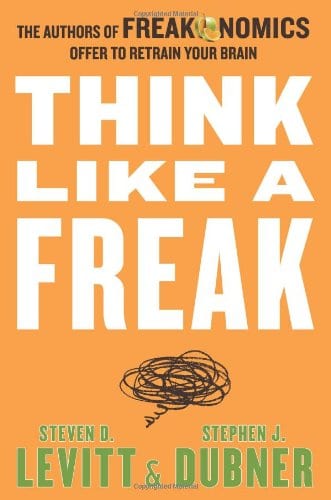 I was recently reading the latest book in the Freakonomics series by Steven D. Levitt and Stephen J. Dubner titled “Think Like a Freak.” While I have enjoyed all the titles in the series, I think the latest one is the best for CEOs, as it outlines how to approach problems from their unique perspective. One of the constant challenges for CEOs is: “How do I get information from the organization that is as unbiased as possible?”
I was recently reading the latest book in the Freakonomics series by Steven D. Levitt and Stephen J. Dubner titled “Think Like a Freak.” While I have enjoyed all the titles in the series, I think the latest one is the best for CEOs, as it outlines how to approach problems from their unique perspective. One of the constant challenges for CEOs is: “How do I get information from the organization that is as unbiased as possible?”
In classic “the emperor has no clothes” fashion, very few people are willing to directly tell the CEO negative news about the organization. As a result, chief executives must find creative ways to gather intelligence. The story below shows why it is so important to have a system to gather predictive data from everyone in your organization. You may be surprised by what you learn.
We once consulted with a huge multinational retail chain that was planning to open its first store in China. The company’s top executives were deeply committed to opening on time. About two months beforehand, they gathered the leaders of the seven teams involved in the opening, and asked each one for a detailed status report. All the reports were positive. All the team leaders were then asked to pick one of three signals— a green light, yellow light, or red light— to indicate their confidence in an on-time opening. All seven of them picked the green light. Great news! As it happens, this firm had also set up an internal prediction market, where any employee could anonymously place a small bet on various company directives. One bet asked whether the Chinese store would open on time. Considering that all seven team leaders had given it a green light, you might expect bettors to be similarly bullish. They weren’t. The prediction market showed a 92 percent chance the store wouldn’t open on time. Guess who was right— the anonymous bettors or the team leaders who had to stand in front of their bosses? The Chinese store did not open on time. It’s easy to identify with the leaders who gave the project the green light. Once a boss gets “go fever,” it takes a lot of courage to focus on potential failures. Institutional politics, ego, and momentum are all conspiring against you. And ‘go fever’ can have consequences far more tragic than the late opening of a Chinese flagship store.
Levitt, Steven D.; Dubner, Stephen J. (2014-05-12). Think Like a Freak: The Authors of Freakonomics Offer to Retrain Your Brain (pp. 196-197). HarperCollins. Kindle Edition.





0 Comments
Trackbacks/Pingbacks